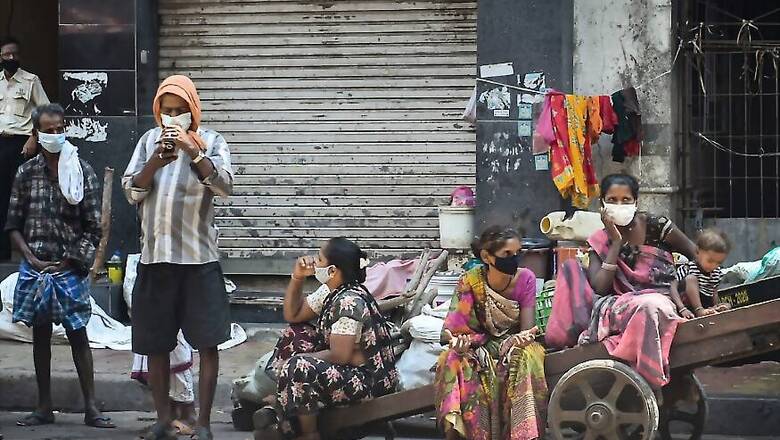
views
Decades and even centuries are tiny blips in the history of civilizations. The peaks and troughs come and go, so do rulers and leaders. What stays for the longer term is the civilisations’ way of living that impresses upon the rest of the world. Legacy is what endures the test of time. This legacy is a function of a long line of scientific way of living — often termed as archaic and revisionist by some, heralded as time-tested by others.
Either long episodes in one particular direction such as colonisation or black-swan events such as World Wars tip the scale of balance between civilisations. Covid-19 is one such black-swan event that will tip the scales in favour of Indian way of living.
When in Rome, do as the romans do. This implies following a way of life of the locals. By corollary, this also means that when you don’t know what to do, pick habits and dos and don’ts from people who know what works.
This seems to be the case for the Indian way of living that is fast catching up on the rest of the world, which seems to be on a new-found quest of sustainable living, providing peace in the midst of chaos, and a desire to synchronise oneself with the environment and profit motives of the present times. With yoga, intermittent fasting, Indian cuisine and meditation are already becoming part of everyday lives in other parts of the world, it is what we can call a civilisational resurfacing of sorts.
Covid-19 will just clear the deck for a full-fledged move towards the Indian way of living. The event will just accelerate the catch up with an Indian style of living.
To claim civilisational superiority or blow the trumpet of arrogance about something which we have merely inherited in times of this unprecedented crisis would be abhorrent. But to miss this global shift would be wrong for all the right reasons.
By acknowledging it, we can spend resources to dig and propagate all the right practices of Indian way of living to the rest of the world. In the recent past, the colonial rule of two centuries crumpled out any sense of ownership of our Indian way of living from majority of Indians. The last few decades has had us reclaiming our style of living along with a similar appreciation from other parts of the world.
Early in the spread of Covid-19, Israel’s Prime Minister lauded India’s way of greeting with namaste, which has now been practised by not only world leaders but by bureaucrats and common citizens worldwide. The North Indian practice of aadaab — an Islamic greeting that is widely practiced in the Indian subcontinent — also avoids physical touch of any sorts.
It is as surprising that advisories were to be issued in the West asking them to not wear footwear inside the house. It has been a traditional practice all over India, especially in our villages, to take off our shoes/slippers outside the house. This could also be a reason why places of worship in India mandate to take off the footwear outside.
The practice of washing hands is a common habit among Indians. No Indian finds it unnatural to follow this advisory — which from the social media seems to be a problem in the West. Not only this, the biggest focus is on avoiding non-vegetarian food. There has been a history of viruses, including Wuhan, originating from indiscriminate consumption of wild wet food. Even as Indians consume non-vegetarian food, they belong to animals that have been domesticated for thousands of years and cooked in a manner that leave little room for such virus transmission.
On matters of food, our spices and ingredients have caught the fancy of Europeans since the 15th century but some of the edible concoctions are finding an audience, which are so common that an average Indian swears by them. Tulsi chai, turmeric milk, giloy, ginger-garlic-onion paste for meals, water kept in copper utensils are just some of the examples. The Ayurveda had it figured out from the start. The fact that the patients need to be quarantined — the use of pattals (plates made out leaves) is a common solution if one has a patient at home. You can burn it after use and doesn’t burn a hole in your pocket.
Literally coming full circle, we are seeing much ado about people fighting over toilet paper. For Asians travelling to the West, the absence of bidet was one of the things that confounded us the most. We have been using lota for hygiene purposes since the Indus Valley civilization. Once the scourge of this virus is over, the ongoing discussion of utility of bidets might find way in the average western household. The demand for bidet is already growing in the West.
Chained to home, people will further discover that yoga is the only form of holistic exercise that can help them evade mental stress while giving them physical fitness—all in the confines of their room. Meaningful relations with our neighbourhood—mohalla as we call it in India—finds a whole new meaning as the world is forced to work from home.
There are many more such salient features of Indian way of living that can not only help us fight the coronavirus spread but also prevent any such cases in the future. By the Indian way of life, I imply the South Asian way of life—and there is also considerable merit in drawing such practices from other Asian countries such as Japan and China.
Every civilization has a lot to offer. Indian way of life, over thousands of years, has focused on surviving in most odd climates and terrains, with a sole purpose of reconciling one’s living with the nature and any such contemporary motives. In today’s case, it is the profit motive of the private sector. As Indians and fellow citizens, we should be humbly sharing these evidence-based practices and more with the rest of the world since that is also the Indian way of living.
(The author is Public Policy Specialist, NITI Aayog. Views are personal.)



















Comments
0 comment